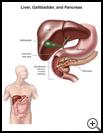
Autoimmmune Hepatitis
________________________________________________________________________
KEY POINTS
- Autoimmune hepatitis is a rare, long-term disease of the liver that causes pain, swelling, and tissue death in the liver.
- You may not need treatment in mild cases, or you may need to take medicines such as steroids and azathioprine. For serious case, if your liver stops working, you may need a liver transplant.
- Ask your provider how to take care of yourself at home, what symptoms to watch for, and what to do if you have them.
________________________________________________________________________
What is autoimmune hepatitis?
Autoimmune hepatitis is a rare, long-term disease of the liver. Autoimmune means that your body mistakenly attacks your own tissue.
The liver is one of the largest organs and is a very important part of your body. Some of the functions of the liver include:
- Helping your body get rid of some medicines and harmful substances
- Making bile, which helps your body digest fats
- Storing glucose (sugar), which your body uses for energy
- Making many proteins, which are the building blocks for all cells in the body
Autoimmune hepatitis is a serious type of liver disease that causes pain, swelling, and sometimes, liver failure. It can be life-threatening.
What is the cause?
The immune system is your body’s defense against infection. Antibodies are proteins your immune system makes to help fight infections. When you have autoimmune hepatitis, your immune system makes antibodies that mistakenly attack the liver. It may be swollen and tender. Some liver tissue may be destroyed.
You have a greater risk of having this condition if:
- You are female
- You have another autoimmune disease such as:
- Type 1 diabetes
- Graves’ disease or Hashimoto’s disease, which affect the thyroid
- Ulcerative colitis
- Celiac disease
- Crohn’s disease
- Lupus
- Sjögren’s syndrome
What are the signs and symptoms?
You may not have symptoms at first. Later symptoms may include:
- Feeling tired
- Loss of appetite
- Nausea
- Pain just below the ribs on your right side
- Joint pain
- Dark urine
- Yellowish skin and eyes (jaundice)
- Bowel movements that are whitish, light yellow, or gray, and may be looser than normal
How is it diagnosed?
Your healthcare provider will ask about your symptoms and medical history and examine you. Tests may include:
- Blood tests
- CT scan, which uses X-rays and a computer to show detailed pictures of the liver
- MRI, which uses a strong magnetic field and radio waves to show detailed pictures of the liver
- A liver biopsy, which is the removal of a small sample of tissue for testing
How is it treated?
You may not need to take medicines if you have mild autoimmune hepatitis without symptoms.
Treatment includes medicines such as steroids and other medicines that help decrease your immune system reactions. You may need to take medicines for months or years.
With early diagnosis and treatment, you may have times when you do not have symptoms (remission). This means that your blood tests are nearly normal. Autoimmune hepatitis may become active again, so you will need to see your healthcare provider for regular checkups during and after treatment.
If your liver becomes scarred (cirrhosis) and is not working well, you may need a liver transplant.
How can I take care of myself?
- Follow your healthcare provider's instructions for taking medicine for your symptoms. Ask your provider which medicines you can safely take for symptoms such as itching and nausea.
- Avoid taking medicines that can damage the liver such as acetaminophen and some antibiotics. Talk with your health care provider before you take any prescription or nonprescription medicines, herbs, or supplements.
- Exercise regularly according to your healthcare provider's instructions. Follow your provider's advice for how much rest you need.
- Eat a healthy diet to keep a healthy weight. Obesity can lead to other problems with the liver such as fatty liver disease.
- Do not drink alcohol.
- Try to reduce stress and take time for activities that you enjoy.
- Talk with your family and your healthcare providers about your concerns. Support groups can help by sharing common concerns and solutions to problems with others in the same situation.
- If you are a female thinking about getting pregnant, talk to your healthcare provider about how to continue your treatment and have a healthy pregnancy.
- Ask your provider:
- How and when you will get your test results
- If there are activities you should avoid and when you can return to your normal activities
- How to take care of yourself at home
- What symptoms or problems you should watch for and what to do if you have them
- Make sure you know when you should come back for a checkup.

